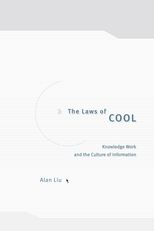 The Laws of Cool: Knowledge Work and the Culture of Information
The Laws of Cool: Knowledge Work and the Culture of Information
Contents
-
-
-
-
-
-
-
-
Subject Work Subject Work
-
(New) Class Work (New) Class Work
-
Teamwork Teamwork
-
“X” “X”
-
-
-
-
-
-
-
-
-
-
Cite
Abstract
To understand knowledge work from the perspective of the humanities, this chapter reviews three explanations of the concept that arose independently and largely in ignorance of each other: subject work, New Class work, and teamwork. The first two are academic approaches characteristic of the humanities in their now prevailing cultural critical personality. The third is the neo-corporate business thesis that seems destined to buy out the others. Where there was “identity group” and “cultural class,” there will now be only that elementary unit of corporate knowledge work, the team. Since about 1980, the dominant, if unwitting, explanation of knowledge work in the humanities, especially in literature departments, has been the cultural criticism of identity and subject. Knowledge work was a subject or identity work as vast as all culture. New Class work also arose in the academy, but from the direction of sociology rather than literary cultural studies. This chapter analyzes the general sociology of culture-based class distinctions proposed by Pierre Bourdieu as well as the more specific sociology of the New Class.
Sign in
Personal account
- Sign in with email/username & password
- Get email alerts
- Save searches
- Purchase content
- Activate your purchase/trial code
- Add your ORCID iD
Purchase
Our books are available by subscription or purchase to libraries and institutions.
Purchasing information| Month: | Total Views: |
|---|---|
| November 2022 | 1 |
| January 2023 | 5 |
| April 2023 | 2 |
| December 2023 | 3 |
| January 2024 | 2 |
| March 2024 | 1 |
| May 2024 | 1 |
| June 2024 | 2 |
| August 2024 | 1 |
| September 2024 | 1 |
| January 2025 | 4 |



Get help with access
Institutional access
Access to content on Oxford Academic is often provided through institutional subscriptions and purchases. If you are a member of an institution with an active account, you may be able to access content in one of the following ways:
IP based access
Typically, access is provided across an institutional network to a range of IP addresses. This authentication occurs automatically, and it is not possible to sign out of an IP authenticated account.
Sign in through your institution
Choose this option to get remote access when outside your institution. Shibboleth/Open Athens technology is used to provide single sign-on between your institution’s website and Oxford Academic.
If your institution is not listed or you cannot sign in to your institution’s website, please contact your librarian or administrator.
Sign in with a library card
Enter your library card number to sign in. If you cannot sign in, please contact your librarian.
Society Members
Society member access to a journal is achieved in one of the following ways:
Sign in through society site
Many societies offer single sign-on between the society website and Oxford Academic. If you see ‘Sign in through society site’ in the sign in pane within a journal:
If you do not have a society account or have forgotten your username or password, please contact your society.
Sign in using a personal account
Some societies use Oxford Academic personal accounts to provide access to their members. See below.
Personal account
A personal account can be used to get email alerts, save searches, purchase content, and activate subscriptions.
Some societies use Oxford Academic personal accounts to provide access to their members.
Viewing your signed in accounts
Click the account icon in the top right to:
Signed in but can't access content
Oxford Academic is home to a wide variety of products. The institutional subscription may not cover the content that you are trying to access. If you believe you should have access to that content, please contact your librarian.
Institutional account management
For librarians and administrators, your personal account also provides access to institutional account management. Here you will find options to view and activate subscriptions, manage institutional settings and access options, access usage statistics, and more.